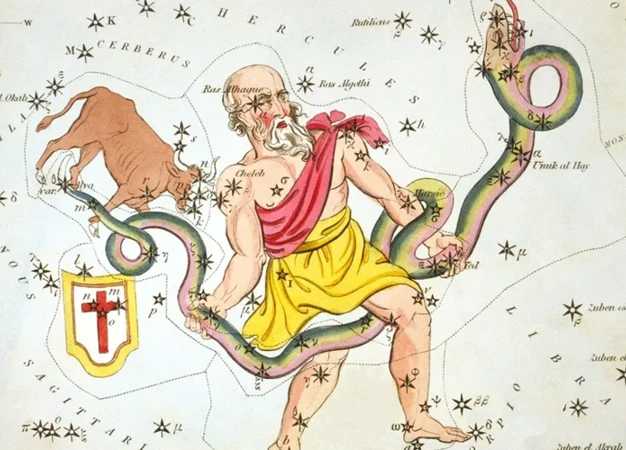Have you ever heard of Ophiuchus? This mysterious figure from ancient mythology has recently gained attention for being the 13th sign of the zodiac, alongside the familiar 12 signs we all know. But who is Ophiuchus and what is their connection to astrology? In this article, we will delve into the mythology behind Ophiuchus, exploring its origins, symbolism, and the various myths and legends associated with this enigmatic serpent bearer. So, join us on a quest to uncover the truth behind Ophiuchus and its intriguing presence in ancient stories and astrological beliefs.
Contents
- The Origins of Ophiuchus
- The Symbolism of Ophiuchus
- Ophiuchus in Astrology
- Myths and Legends Surrounding Ophiuchus
- Alternative Interpretations of Ophiuchus
- Conclusion
-
Frequently Asked Questions
- 1. Is Ophiuchus a recognized zodiac sign?
- 2. What are the characteristics of Ophiuchus individuals?
- 3. Can Ophiuchus individuals find compatibility with other zodiac signs?
- 4. How does Ophiuchus affect astrological predictions?
- 5. Is Ophiuchus part of the traditional zodiac calendar?
- 6. What is the role of trust in Ophiuchus relationships?
- 7. What are some alternative interpretations of Ophiuchus?
- 8. Can Ophiuchus individuals possess both positive and negative traits?
- 9. How does Ophiuchus differ from Sagittarius and Scorpio?
- 10. Can Ophiuchus be included in personal birth chart readings?
- References
-
Frequently Asked Questions
- 1. What is the meaning of Ophiuchus in Greek mythology?
- 2. How did Ophiuchus become a part of astrology?
- 3. What are the characteristics of individuals born under the sign of Ophiuchus?
- 4. What is the significance of the serpent in Ophiuchus mythology?
- 5. How does Ophiuchus relate to the battle with Scorpius?
- 6. Can Ophiuchus be found in different cultures around the world?
- 7. What is the connection between Ophiuchus and immortality?
- 8. How does Ophiuchus feature as a constellation in the night sky?
- 9. What are some other names for Ophiuchus in different cultures?
- 10. How does Ophiuchus challenge the traditional zodiac system?
- References
- Read More
The Origins of Ophiuchus
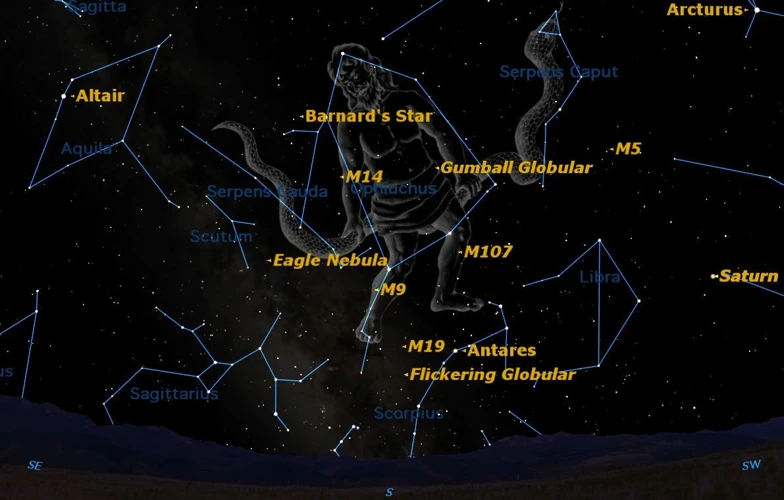
In order to understand the origins of Ophiuchus, we must travel back to ancient Greek mythology. Ophiuchus is often associated with the legendary figure of Asclepius, the Greek god of healing. According to mythology, Asclepius was the son of Apollo and Coronis. Asclepius was a skilled healer and became known for his ability to resurrect the dead, which eventually led to conflicts with the gods. Asclepius’ journey and his association with serpents played a significant role in the emergence of Ophiuchus.
One popular myth tells the story of how Asclepius learned the art of healing from a serpent. While walking through a field one day, Asclepius came across a serpent fighting against another creature. Asclepius intervened and killed the creature attacking the serpent with his staff. In gratitude, the serpent shed its skin, revealing a second serpent that was miraculously healed. Impressed by this sight, Asclepius took the shedding serpent’s skin and used it as a symbol of healing, now known as the Rod of Asclepius.
The association between healing and serpents became deeply ingrained in Greek mythology, and Ophiuchus emerged as a symbol of healing and medicine. The constellation itself is often depicted as a man holding a snake, representing the figure of Asclepius and his serpent companion. This symbolism further reinforces the connection between Ophiuchus and the healing arts.
It is worth noting that while the origins of Ophiuchus lie in Greek mythology, its significance extends beyond this culture. Ophiuchus is also seen in other civilizations such as the Mayans, where it holds a distinct place in their calendar system. This cross-cultural presence adds another layer of intrigue to the origins of Ophiuchus. To further explore the personality traits associated with Ophiuchus individuals, read our article on ‘Ophiuchus Personalities‘.
The Symbolism of Ophiuchus
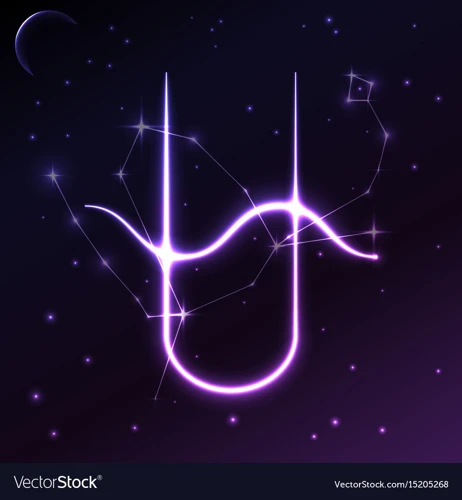
The symbolism of Ophiuchus is deeply rooted in its association with healing and wisdom. The image of a figure holding a serpent represents the power to harness and control the energy of the snake. The serpent, throughout various cultures and beliefs, represents transformation, rebirth, and wisdom. In the case of Ophiuchus, the symbolism of the serpent goes hand in hand with the figure’s role as a healer. The serpent sheds its skin, symbolizing renewal and healing, while the figure of Ophiuchus holds it, signifying the ability to heal and bring about transformation. This symbolism resonates with the characteristics of Ophiuchus individuals who are often seen as charismatic, wise, and intuitive healers. To explore more about the role of trust in Ophiuchus relationships, take a look at our article on ‘The Role of Trust in Ophiuchus Relationships‘.
The Serpent and Healing
The serpent holds a significant role in the mythology of Ophiuchus, particularly in its association with healing. Across various cultures, the serpent has been seen as a symbol of transformation, rebirth, and wisdom. This symbolism is deeply intertwined with the concept of healing, making the serpent an essential element in understanding Ophiuchus.
In Greek mythology, the serpent played a crucial part in the story of Asclepius, the god of medicine. As mentioned earlier, Asclepius discovered the healing properties of herbs and remedies while observing a serpent’s behavior. The shedding of the serpent’s skin represented renewal and regeneration, which mirrored the healing process itself. The Greeks believed that the serpents possessed healing abilities and were connected to the realm of the divine.
This motif of the serpent as a symbol of healing can also be found in other ancient cultures. In Mesoamerican civilizations, such as the Mayans, serpents were revered as sacred beings associated with knowledge and transformation. The Mayan calendar, which holds great significance in their culture, features the image of a serpent, emphasizing its role in marking the passage of time and cycles of life.
The serpent’s capacity for shedding its skin and emerging renewed has been interpreted as a metaphor for the process of healing and personal growth. It represents the ability to let go of the old and embrace new beginnings. This connection between the serpent and healing can be further explored in our article on the ‘Significance of the Mayan Calendar in Mesoamerican Civilizations‘. Through this exploration, we can gain a deeper understanding of how the serpent’s symbolism resonates across different cultures and its intertwining relationship with healing practices.
The Connection to Asclepius
The connection between Ophiuchus and Asclepius is a central aspect when exploring the mythology behind this enigmatic figure. As mentioned earlier, Asclepius was a Greek god associated with healing and medicine, and his story intertwines with the emergence of Ophiuchus as a symbol and constellation.
In Greek mythology, Asclepius was revered for his extraordinary healing abilities. He possessed the knowledge and skills to cure illnesses and even restore life to the dead. Asclepius’ methods of healing often involved the use of serpents, which further solidifies the connection between him and Ophiuchus.
The most famous symbol associated with Asclepius is the Rod of Asclepius, which features a serpent entwined around a staff. This symbol has come to represent the medical profession and is still used today as the emblem of many medical organizations and institutions. The serpent’s presence in the symbol is a direct nod to the role serpents played in Asclepius’ healing practices.
The association with serpents in the context of healing can be traced back to an intriguing myth surrounding Asclepius. According to the myth, Asclepius once encountered a serpent bringing healing herbs to restore another serpent’s sight. Inspired by this act of compassion and the serpents’ connection to healing, Asclepius incorporated serpents into his medicinal practices.
It’s important to note that the connection between Asclepius and Ophiuchus isn’t limited to Greek mythology. Similar figures and serpent symbolism can be found in other cultures worldwide. For example, in Mesoamerican civilizations, such as the Mayans, serpents were also associated with healing and had a significant presence in their mythology and calendar systems. To explore further the significance of serpents in different cultures, read our article on ‘The Significance of the Mayan Calendar in Mesoamerican Civilizations‘. The cross-cultural existence of this motif underscores the enduring fascination and reverence for the healing powers associated with serpents, as represented by Ophiuchus and its connection to Asclepius.
Ophiuchus in Astrology
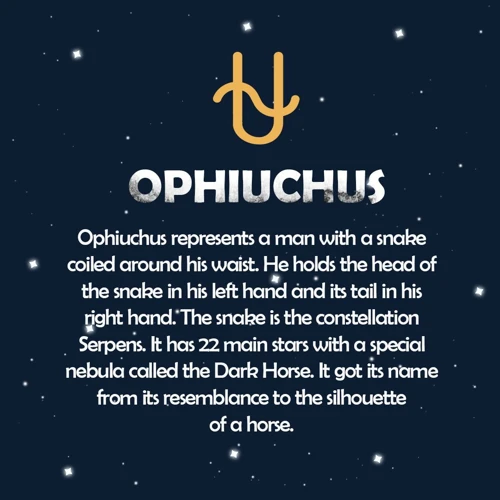
Ophiuchus holds a unique position in astrology, as it is considered the 13th sign of the zodiac. This addition to the traditional 12 signs has sparked discussions and debates among astrologers and enthusiasts. The inclusion of Ophiuchus as a zodiac sign is based on the idea that the Earth’s position in relation to the constellations has shifted over time. Some astrologers believe that Ophiuchus represents a distinct set of personality traits and characteristics that differentiate it from the other signs. These individuals are said to possess qualities such as intuition, wisdom, healing abilities, and a deep connection to spiritual and esoteric knowledge. However, it is important to note that not all astrologers recognize Ophiuchus as a separate sign, and its interpretation and significance in astrology remain a subject of ongoing debate.
Adding the 13th Zodiac Sign
Adding a 13th zodiac sign to the traditional 12 has been a topic of debate and speculation in recent years. The introduction of Ophiuchus as the 13th sign has caused shifts and discussions among astrologers and enthusiasts alike. The controversy stems from the alignment of the zodiac signs with the constellations, as well as the interpretation and significance of Ophiuchus.
Traditionally, the zodiac consists of 12 signs that correspond to specific dates and personality traits. However, the constellations have shifted over time due to axial precession, leading some to argue that Ophiuchus should be considered as an additional sign. Advocates for the inclusion of Ophiuchus claim that its presence brings a balance and completeness to the zodiac system.
Characteristics associated with Ophiuchus individuals differ from those of other signs. Ophiuchus individuals are said to possess qualities such as intuition, wisdom, and healing abilities. They are often seen as seekers of truth and are drawn to philosophical and spiritual pursuits. These distinct characteristics contribute to the belief that Ophiuchus deserves a rightful place in the zodiac lineup.
However, it is important to note that not all astrologers agree on the incorporation of Ophiuchus. Some argue that the traditional 12 sign system is deeply rooted in history and should remain unchanged. Others view Ophiuchus as a valid addition that enhances astrological interpretations.
Regardless of where one stands on the matter, the discussion surrounding the addition of the 13th zodiac sign has sparked interest and curiosity in the astrological community. It highlights the evolving nature of astrology and encourages individuals to explore their own beliefs and interpretations. To dive deeper into the characteristics of Ophiuchus individuals and their role in relationships, check out our article on ‘The Role of Trust in Ophiuchus Relationships‘.
Characteristics of Ophiuchus Individuals
Characteristics of Ophiuchus Individuals:
1. Intuitive and Wise: Ophiuchus individuals are known for their heightened intuition and wisdom. They have a natural ability to tap into their instincts and often possess a deep understanding of the world around them. This wisdom allows them to offer valuable insights and guidance to others.
2. Healing Abilities: Just like the serpent bearer in mythology, Ophiuchus individuals have a natural affinity for healing. They possess a strong desire to help and nurture others, whether it be through physical, emotional, or spiritual means. Their compassionate nature makes them excellent caregivers and trusted confidants.
3. Charismatic and Magnetic: Ophiuchus individuals exude a magnetic charm and charisma that draws people towards them. They have a captivating presence that makes them stand out in a crowd. Their magnetic personality combined with their nurturing nature often makes them natural leaders and influencers.
4. Seekers of Truth: Ophiuchus individuals have a deep desire to uncover the truth and seek out knowledge. They are curious by nature and constantly strive to expand their understanding of the world. This quest for truth can sometimes make them skeptical of conventional beliefs and theories, leading them to explore alternative perspectives.
5. Balancing Dualities: Ophiuchus individuals have a unique ability to balance opposing forces and find harmony in seemingly contradictory elements. This ability to navigate through complexities allows them to see multiple sides of a situation and make balanced decisions. They embrace both light and dark aspects of life, understanding the inherent balance that exists in the universe.
6. Privacy and Solitude: Ophiuchus individuals also value their privacy and enjoy spending time in solitude. This time for reflection and introspection allows them to recharge and connect with their inner selves. They appreciate the quiet moments and find solace in their own company.
7. Natural Healers: Ophiuchus individuals possess a genuine desire to heal not only others but also themselves. They understand the importance of self-care and are diligent in maintaining their well-being. They often explore various holistic practices and alternative therapies to achieve overall balance and harmony in their lives.
Understanding the unique characteristics of Ophiuchus individuals helps shed light on their complex and intriguing nature. To explore the role of trust in Ophiuchus relationships, check out our article on ‘The Role of Trust in Ophiuchus Relationships‘.
Myths and Legends Surrounding Ophiuchus
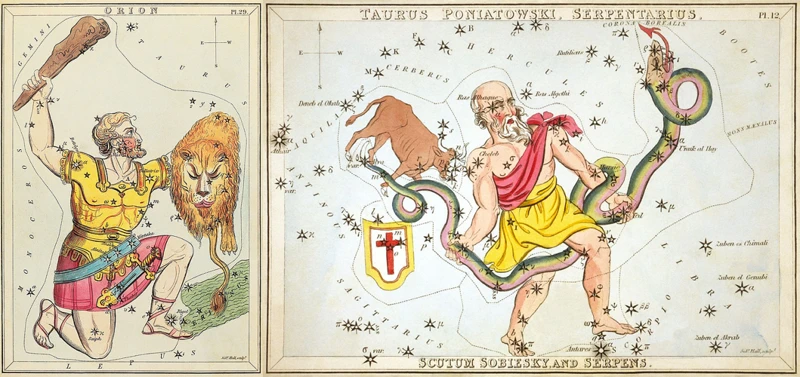
Myths and legends surrounding Ophiuchus are as captivating as the constellation itself. One prominent myth involving Ophiuchus is the battle between Ophiuchus and Scorpius. According to the story, Ophiuchus was a skilled healer who had the power to resurrect the dead. This ability sparked envy among the gods, who feared his potential to challenge their authority. As a result, Scorpius was sent to attack Ophiuchus. In a fierce battle, Ophiuchus managed to defeat Scorpius and was even able to resurrect himself after being bitten by the scorpion. This myth symbolizes the eternal struggle between life and death. Another intriguing legend surrounding Ophiuchus is the quest for immortality. It is said that Ophiuchus sought a way to achieve eternal life by venturing into the underworld. Through his incredible healing abilities and determination, he managed to navigate the treacherous realm and obtain the secret to immortality. These myths serve as reminders of Ophiuchus’ significance in ancient folklore and the enduring themes of life, death, and the pursuit of eternal life.
The Battle with Scorpius
In the mythical realm, Ophiuchus is often associated with a great battle against Scorpius, the constellation representing the scorpion. According to Greek mythology, this epic battle between Ophiuchus and Scorpius took place because the scorpion was sent by the goddess Gaia to kill Orion, the great hunter and a friend of Ophiuchus. Gaia was angered by Orion’s boastful claims that he could kill every creature on Earth. In order to protect his friend and seek justice, Ophiuchus engaged in a fierce battle with Scorpius.
The battle between the two constellations is said to be a never-ending struggle in the night sky. As Ophiuchus and Scorpius clash in combat, their cosmic struggle demonstrates the eternal conflict between good and evil, justice and vengeance. This ongoing celestial confrontation serves as a reminder of the consequences one may face when challenged by the forces of nature and divine powers.
The tale of this battle between Ophiuchus and Scorpius also symbolizes the ongoing struggle to achieve balance and harmony in our lives. It represents the ever-present tension between our higher aspirations and the forces that seek to hinder our progress. This symbolic battle resonates with individuals who feel the weight of their own personal conflicts and strives to find a resolution.
To explore more about the mythology of Ophiuchus and its significance in astrology, continue reading our article on ‘The significance of Mayan Calendar in Mesoamerican Civilizations‘.
The Quest for Immortality
In the realm of myths and legends surrounding Ophiuchus, there is a fascinating tale known as “The Quest for Immortality.” According to ancient stories, Ophiuchus possessed the knowledge and ability to conquer death and achieve eternal life. This quest for immortality became a central theme in the mythology surrounding Ophiuchus.
One version of the myth revolves around Ophiuchus’ encounter with a grieving widow named Glaucus. After the death of her beloved husband, Glaucus turned to Ophiuchus, renowned for his healing powers, in desperate hope of bringing her husband back to life. Moved by her anguish, Ophiuchus agreed to help her.
Ophiuchus embarked on a perilous journey to seek the legendary Elixir of Immortality. Legends say that he ventured into the depths of mysterious and treacherous lands, facing formidable challenges along the way. Eventually, Ophiuchus reached the sacred Garden of the Hesperides, where the Tree of Life grew, bearing the coveted Golden Apples of Immortality.
In this wondrous garden, Ophiuchus confronted numerous trials, testing his wisdom, courage, and perseverance. Eager to obtain the Golden Apples, he endured physical and spiritual trials, battling mythical creatures and resisting temptations. Through his determination and unwavering commitment, Ophiuchus finally obtained a single Golden Apple, believed to hold the power to grant immortality.
However, the quest for immortality came at a great cost. The gods, fearing Ophiuchus would disrupt the natural cycle of life and death, intervened and punished him for his audacity. They banished Ophiuchus from the realm of immortality, turning him into a constellation that would forever rise and set alongside the other zodiac signs.
Despite his failure to attain immortality, Ophiuchus became a symbol of the mortal longing for everlasting life. The myth of the Quest for Immortality serves as a reminder of the human desire to transcend mortality and seek something greater. It is a testament to the ambition and yearning that lies within us all.
The legend of the Quest for Immortality adds depth and intrigue to the mythology surrounding Ophiuchus, highlighting its symbolic significance and the timeless themes it embodies. To explore alternative interpretations of Ophiuchus, including its role in different cultures and as a constellation, continue reading our article on ‘Alternative Interpretations of Ophiuchus‘.
Alternative Interpretations of Ophiuchus
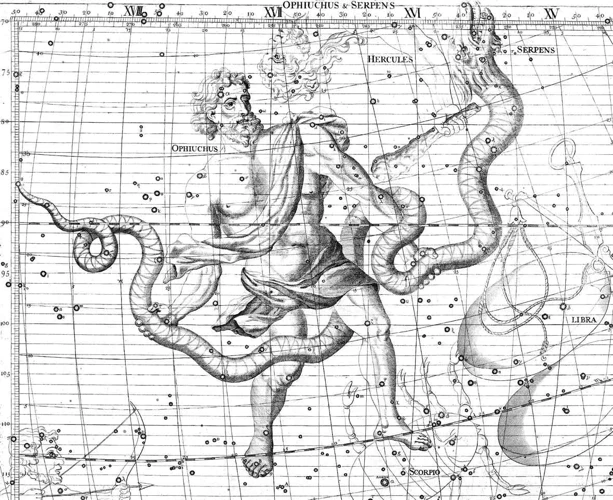
Alternative interpretations of Ophiuchus offer fascinating insights into its significance beyond Greek mythology and astrology. In different cultures around the world, Ophiuchus takes on varied meanings and associations. For example, in Egyptian mythology, Ophiuchus is often linked to the god Imhotep, who served as a healer and was later deified. In Chinese astrology, the constellation associated with Ophiuchus is known as She or She Tzu, representing a divine shepherd. Additionally, Ophiuchus is seen as a constellation in its own right, separate from its association with astrology. Its prominent presence in the night sky has captivated many cultures. Exploring these alternative interpretations of Ophiuchus provides a deeper understanding of its diverse cultural significance and the intriguing stories that have shaped its mythology.
Ophiuchus in Different Cultures
Ophiuchus, the serpent bearer, holds intriguing significance not only in Greek mythology but also across various cultures around the world. Let’s explore how different cultures view and interpret Ophiuchus:
1. Ancient Egyptian: In ancient Egyptian culture, the constellation of Ophiuchus was associated with the god Imhotep, known as the god of medicine and healing. Imhotep was considered one of the most learned men of his time, skilled in various fields, including architecture, astronomy, and medicine. This association between Imhotep and Ophiuchus further solidified the constellation’s connection to healing and wisdom.
2. Chinese: In Chinese astronomy, the stars of Ophiuchus are not recognized as a separate constellation but are part of the larger celestial region known as the Azure Dragon of the East. This cosmic creature is believed to symbolize power, strength, and protection. The inclusion of Ophiuchus within this celestial region adds an element of mysticism to its interpretation within Chinese culture.
3. Native American: Various Native American tribes have their own interpretations and stories surrounding Ophiuchus. For the Lakota Sioux, Ophiuchus is connected to the vision quest and represents the path of healing and spiritual transformation. In Navajo mythology, the constellation is associated with the Great Serpent who brings rain and fertility to the land.
4. Mayan: The Mayans were known for their advanced astronomical knowledge, and Ophiuchus held significance in their calendar system. In Mayan astrology, Ophiuchus is connected to Imix, the symbol of the primal crocodile. Imix represents transformation, birth, and the creative forces of the universe.
5. Mesoamerican: In Mesoamerican civilizations, such as the Aztecs and the Olmecs, the constellation of Ophiuchus was associated with the feathered serpent deity Quetzalcoatl. Quetzalcoatl was considered the god of wisdom, knowledge, and the morning star, often depicted as a serpent with colorful feathers. Ophiuchus’s portrayal as the serpent bearer aligns with the reverence for serpents in Mesoamerican cultures.
These are just a few examples showcasing the diverse interpretations of Ophiuchus across different cultures. The symbolism and mythical tales associated with Ophiuchus reflect the universal human fascination with healing, wisdom, and spiritual transformation. To further explore the intricacies of Ophiuchus in astrology, read our article on ‘Exploring the Significance of the Mayan Calendar in Mesoamerican Civilizations‘.
Ophiuchus as a Constellation
Ophiuchus is not only a figure in mythology and astrology but also a constellation in the night sky. The constellation of Ophiuchus is located near the celestial equator and can be seen in the northern hemisphere during certain times of the year. With its unique position, Ophiuchus holds a special place in the realm of astronomy and stargazing.
The constellation depicts a man holding a serpent, representing the serpent bearer of Greek mythology, Asclepius. Ophiuchus is often associated with the nearby constellations of Scorpius and Serpens. In fact, in some depictions, Ophiuchus is seen standing over the constellation of Scorpius, as if in a battle or conflict. This visual representation adds to the intrigue and symbolism surrounding Ophiuchus.
Ophiuchus is situated between the constellations of Aquila, Serpens, Libra, Scorpius, and Hercules. Its location in the sky gives stargazers the chance to observe this unique constellation and appreciate its distinct characteristics. However, despite its significance, Ophiuchus is often overlooked and not widely recognized, as it is not part of the traditional zodiac system.
It’s important to note that Ophiuchus’ status as a constellation highlights the rich history and cultural significance of celestial observations. Many ancient civilizations, such as the Greeks and Mesopotamians, assigned deep meanings and stories to the constellations, including Ophiuchus. Exploring the role of constellations in various cultures can provide valuable insights into how humans have sought to make sense of the cosmos throughout history.
To dive deeper into different interpretations and cultural significance of Ophiuchus, continue reading our article on ‘Ophiuchus as a Constellation‘.
Conclusion
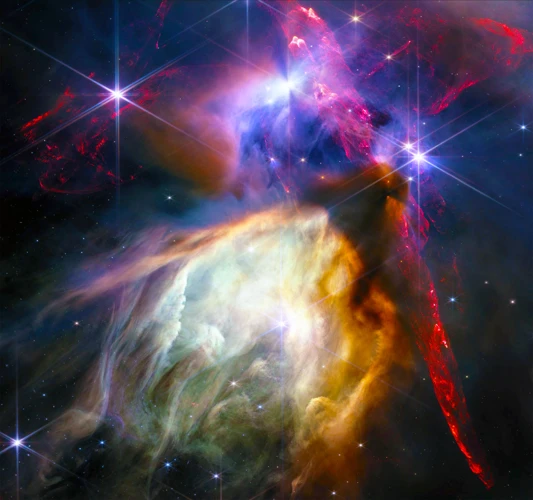
In conclusion, exploring the mythology behind Ophiuchus reveals an intriguing and complex figure deeply rooted in ancient beliefs. Originating from Greek mythology, Ophiuchus is associated with the legendary healer Asclepius and symbolizes the power of healing and medicine. The serpent, a prominent symbol in Ophiuchus’ mythology, represents wisdom, transformation, and renewal.
In astrology, the addition of Ophiuchus as the 13th zodiac sign has sparked debates and discussions among astrologers and enthusiasts. While not widely recognized in mainstream astrology, some believe that Ophiuchus individuals possess unique characteristics such as being intuitive, driven, and passionate about justice. Exploring the personality traits of Ophiuchus individuals can provide further insights into their distinct qualities and behaviors.
Moreover, Ophiuchus is not limited to Greek mythology, as its symbolism and presence can be found in different cultures around the world. From the Mayans and their calendar system to the depiction of Ophiuchus as a constellation, this mythical figure transcends boundaries and holds significance in various cultures.
The enigmatic nature of Ophiuchus invites us to delve deeper into its myths and legends, as well as its alternative interpretations across cultures. Whether viewed through the lens of astrology or explored within the context of different belief systems, Ophiuchus remains a captivating figure that continues to ignite curiosity and fascination.
In conclusion, the mythology behind Ophiuchus sheds light on the rich tapestry of ancient beliefs and the interplay between myth and astrology. As we explore the mysteries surrounding Ophiuchus, we gain a deeper appreciation for the diverse and intricate threads that connect us to our collective human history.
Frequently Asked Questions
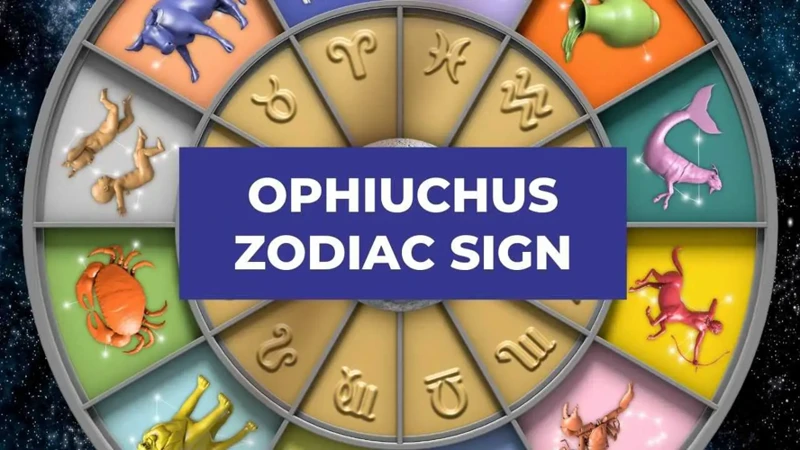
1. Is Ophiuchus a recognized zodiac sign?
While Ophiuchus is not traditionally recognized as one of the 12 zodiac signs, it has recently gained attention as the 13th sign. However, this addition is not widely accepted in mainstream astrology.
2. What are the characteristics of Ophiuchus individuals?
Ophiuchus individuals are believed to possess qualities such as intuition, healing abilities, charisma, and a natural inclination towards the mystical and spiritual. They are often seen as natural healers and seekers of truth.
3. Can Ophiuchus individuals find compatibility with other zodiac signs?
Compatibility with Ophiuchus individuals can vary depending on the individual’s unique traits and the compatibility factors of other zodiac signs. While some believe that Ophiuchus can be compatible with certain signs like Scorpio and Capricorn, others argue that compatibility should be determined on an individual-by-individual basis.
4. How does Ophiuchus affect astrological predictions?
The inclusion of Ophiuchus as a zodiac sign could potentially alter the astrological predictions and interpretations for individuals born within Ophiuchus’s date range. However, it is important to note that astrological predictions are already complex and heavily dependent on various factors, so the addition of Ophiuchus may introduce further complexity.
5. Is Ophiuchus part of the traditional zodiac calendar?
No, Ophiuchus is not part of the traditional zodiac calendar. The 12 zodiac signs that have been widely recognized for centuries include Aries, Taurus, Gemini, Cancer, Leo, Virgo, Libra, Scorpio, Sagittarius, Capricorn, Aquarius, and Pisces.
6. What is the role of trust in Ophiuchus relationships?
In relationships, trust plays a crucial role for Ophiuchus individuals, as they value honesty and transparency. Building a strong foundation of trust is important for fostering healthy and meaningful connections with others. To learn more about the role of trust in Ophiuchus relationships, read our article on ‘The Role of Trust in Ophiuchus Relationships‘.
7. What are some alternative interpretations of Ophiuchus?
Aside from its association with astrology, Ophiuchus holds significance in different cultures. The Mayans, for instance, considered Ophiuchus as part of their calendar system and believed it represented renewal and rebirth. Additionally, some perceive Ophiuchus as a constellation rather than a zodiac sign, appreciating its celestial beauty and mythological stories.
8. Can Ophiuchus individuals possess both positive and negative traits?
Yes, just like individuals of any other zodiac sign, Ophiuchus individuals can exhibit a mix of positive and negative traits. While they may possess healing abilities, intuition, and charisma, they can also experience challenges such as a tendency towards secrecy or jealousy. It’s important to remember that individuals are unique, and their personalities go beyond their zodiac sign.
9. How does Ophiuchus differ from Sagittarius and Scorpio?
In terms of zodiac signs, Ophiuchus falls between Scorpio and Sagittarius. While Ophiuchus shares some characteristics with both signs, it is considered a distinct sign with its own traits. Ophiuchus is associated with healing and mysticism, while Scorpio is linked to intensity and transformation, and Sagittarius is associated with exploration and philosophy.
10. Can Ophiuchus be included in personal birth chart readings?
Some astrologers may include Ophiuchus in personal birth chart readings if they recognize it as a valid zodiac sign. However, it’s important to note that the inclusion of Ophiuchus varies among astrologers, and not all will consider it when conducting birth chart interpretations.
References
- Ophiuchus – The Serpent Bearer – Mystik Maze
- Chandra :: Photo Album :: Constellation Ophiuchus
- Constellations: Ophiuchus
Frequently Asked Questions

1. What is the meaning of Ophiuchus in Greek mythology?
Ophiuchus is associated with the Greek god of medicine and healing, Asclepius. He was known for his ability to cure ailments and even raise the dead, which led to his involvement in many myths and legends.
2. How did Ophiuchus become a part of astrology?
Ophiuchus became a part of astrology when it was proposed as the 13th zodiac sign, representing those born between November 29 and December 17. This addition was suggested to account for the Earth’s slight wobble and its impact on the alignment of the constellations.
3. What are the characteristics of individuals born under the sign of Ophiuchus?
Ophiuchus individuals are believed to possess qualities such as wisdom, intuition, healing abilities, and a strong connection to spirituality. They are often seen as natural healers and are driven by a desire to make a positive impact on the world.
4. What is the significance of the serpent in Ophiuchus mythology?
The serpent in Ophiuchus mythology symbolizes healing and transformation. It represents the shedding of old beliefs and the renewal of the mind, body, and spirit. The serpent is seen as a powerful force for change and growth.
5. How does Ophiuchus relate to the battle with Scorpius?
In mythology, Ophiuchus is often depicted as a figure engaged in a battle with Scorpius, the scorpion. This battle represents the eternal struggle between good and evil, with Ophiuchus representing healing and restoration, while Scorpius symbolizes darkness and chaos.
6. Can Ophiuchus be found in different cultures around the world?
While Ophiuchus has its origins in Greek mythology, similar serpent-bearer figures can be found in various cultures worldwide. These figures often carry similar symbolism of healing, transformation, and wisdom, albeit with different names and stories.
7. What is the connection between Ophiuchus and immortality?
The quest for immortality is a recurring theme in Ophiuchus mythology. Ophiuchus is often depicted as seeking the elixir of eternal life, representing humanity’s desire to transcend mortality and achieve eternal existence.
8. How does Ophiuchus feature as a constellation in the night sky?
As a constellation, Ophiuchus is visible in the northern hemisphere during specific times of the year. It lies along the celestial equator, and its brightest stars form a shape resembling a serpent being held by a man.
9. What are some other names for Ophiuchus in different cultures?
Ophiuchus is known by different names in various cultures. In ancient Egypt, it was associated with the god Imhotep, while in Babylonian astronomy, it was known as Nergal. These variations highlight the universality of the serpent-bearer theme.
10. How does Ophiuchus challenge the traditional zodiac system?
Ophiuchus challenges the traditional zodiac system by introducing a 13th sign, interrupting the 12-sign cycle that has been widely recognized for centuries. This addition sparks debates and discussions among astrologers and enthusiasts about the accuracy and relevance of the zodiac system.
References
- Ophiuchus
- Teaching Students About Ophiuchus: The Serpent Bearer
- Chandra :: Photo Album :: Constellation Ophiuchus
